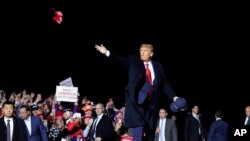Some activities U.S. President Donald Trump attended in the past week, analysts say, have likely been superspreader events for COVID-19, leaving several people infected by the disease caused by the coronavirus, making it difficult to determine who infected whom.
So-called superspreader events occur when one person infects a disproportionate number of other people.
Last week, the president attended a fundraiser Sept. 25 at his Washington hotel. Republican National Committee Chairwoman Ronna McDaniel, who was at the function, has since reported her COVID-19-positive status.
The next day, the White House hosted events for Judge Amy Coney Barrett, Trump’s nominee to replace the late Supreme Court Justice Ruth Bader Ginsburg. Guests were tested for the virus and, if found negative, were told that it was safe to remove their masks to socialize in the Rose Garden and in the White House.
"There's probably several superspreader events mixed up in this one scenario," Susie Welty, a contact tracing expert and technical director of surveillance at the University of California, San Francisco, told USA Today on Friday.
Photos from the Rose Garden event show maskless people sitting side-by-side in rows of chairs.
Since then, two senators who attended the events – Thom Tillis of North Carolina and Mike Lee from Utah -- have reported COVID-19 infections. Others who attended the event and now have confirmed COVID-19-positive status: Notre Dame University President John Jenkins, former New Jersey Gov. Chris Christie, former Trump adviser Kellyanne Conway and Trump campaign manager Bill Stepien.
Christie, who said his symptoms were mild, later Saturday checked himself into a New Jersey hospital as a precaution, citing a history of asthma, he announced on Twitter.
At the first presidential debate Tuesday in Cleveland, Ohio, first lady Melania Trump and the president’s grown children sat in the audience without masks. Melania Trump’s COVID-19-positive status was also released Friday.
"I am frustrated today as I worry now about my own health and the health of so many others who were present that evening like journalists, support staff, Cleveland Clinic professionals, and many others who could have potentially been exposed," Ohio House Minority Leader Emilia Strong Sykes said in a statement Friday. “This is a very somber moment for our country in a year of somber moments."
John Brownstein, a Harvard epidemiologist with Boston Children's Hospital and ABC News contributor, told the network that Trump “was likely infectious by Tuesday if not earlier.”
"Given the sheer volume of potential contacts of the president over the days ahead of his diagnosis, public health officials should be very worried about the emergence of a superspreading event," Brownstein told ABC News. "Those who have been in contact with the president must proceed with extreme caution."
On Wednesday, the president went to Minnesota for a fundraiser in Shorewood and a rally in Duluth. Trump aide Hope Hicks started feeling ill on the way back to Washington and is reported to have self-isolated on the plane. Hicks also had been with the president in Cleveland.
Hicks had tested negative for the virus earlier Wednesday but tested positive Thursday morning. Despite his exposure to Hicks, Trump traveled to New Jersey Thursday for a fundraiser at his golf club, where he mingled maskless with maskless guests.
By late Thursday, the Bloomberg News reported that Hicks was COVID-19-positive and the White House confirmed the story.
Welty told USA Today that it may have been "inevitable" Trump and others close to him became infected with COVID-19. “They were relying solely on testing to keep them safe," but not using such things as masks or social distancing, which can prevent infection, she said.
"It's too late once you test positive,” Welty told the newspaper. By that time, "you've already been around too many people and spread it to too many people.”
New Jersey public health officials are conducting contact tracing to warn fundraiser participants of their possible exposure to the coronavirus-caused disease.
Wisconsin Sen. Ron Johnson also has tested positive for the coronavirus after being exposed to someone “who tested positive for COVID-19 on Sept. 14,” his spokesman said in a statement Saturday.





